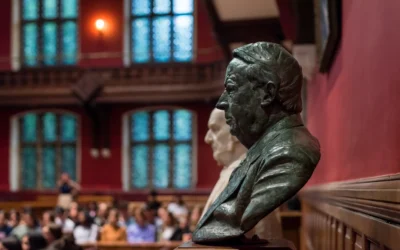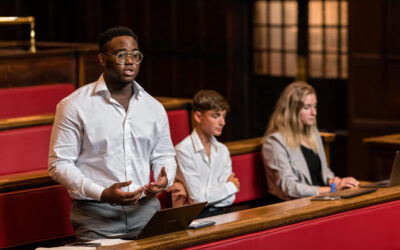Marriage is one of the most important events in many people’s lives, and often it is a very happy experience. But what happens if you’ve tied the knot, and find yourself wishing you could untie it? In a recent decision, Owens v Owens, the Supreme Court has shown that current UK divorce laws can make this difficult for some. In doing so the Court has revealed a lot about not only the law governing relationships between people, but also the relationship between the different institutions of the legal system.
Mr. and Mrs. Owens were married and had children who had grown to adulthood. Over time however, the two had grown apart (specifically one house apart, as Mrs. Owens now lived next door). Mrs. Owens filed for divorce on the basis of her husband’s behaviour, which she said was authoritarian and made her unhappy.
However, Mrs. Owens’ plan was foiled when Mr. Owens disputed the allegation, saying the marriage remained happy. As Lord Wilson noted in his speech, this is a rare occurrence.
According to the relevant legislation, Mrs. Owens therefore had to prove that she could not reasonably be expected to live with her husband any longer, which the judge at first-instance said she had failed to do. The Supreme Court reluctantly agreed.
The really interesting part of the case is the fact that the Supreme Court obviously wanted to overturn the judge’s decision, but felt that they couldn’t do so because of the applicable statute.
Lady Hale said “I have found this a very troubling case” . Lord Wilson also appeared to regret the current state of the law, suggesting that Parliament might wish to consider replacing the legislation. However the judges all agreed that there was nothing they could do.
I think this case has three interesting things to tell us:
Firstly, a reform to divorce law may be imminent.
Mrs. Owens’ case shows that restrictive rules on divorce can lead to apparent injustice, and it is likely that politicians will respond to this. Mrs. Owens has been forced to stay in a marriage she resents, which doesn’t seem right and doesn’t seem to respect her liberty.
On the other hand, changes to the law are likely to be at least as controversial as the result produced by the current rules. Even now, most divorce claims are allowed without any question or delay at all, as Lord Wilson noted. If the rules are loosened further, it might raise questions as to whether marriage has any purpose at all. Marriage has traditionally been a strong bind between two people- but some might argue they should simply remain friends or partners if marriage is made very easy to dissolve.
Marriage is of course a very sensitive topic for religious reasons too, and politicians will be wary of creating controversy in this way.
It should also be remembered that marriage has implications for many other areas of the law. For example, married couples get significant tax advantages compared to unmarried people. If marriage is made less restrictive, a lot of people might be tempted to get married temporarily for tax reasons, and then divorce as soon as a deal has gone through. It sounds unlikely, but legislators will need to keep these potential implications in mind when they change the law.
Secondly, it is notable that in spite of their criticism, the judges nevertheless applied the relevant legislation directly.
The judges of the Supreme Court knew that they were bound to act as they did, because of the UK Constitution.
There are three main sources of power in the Constitution: Parliament (the legislator), the government (the executive) and the courts (the judiciary).
Unwritten rules state that Parliament is superior to both the other bodies of state. It creates legislation, which judges must enforce and the government must obey.
Members of Parliament are elected by the public, whereas judges are of course not elected. For this reason Parliament creates the law, and judges are not supposed to question or change it. If judges were allowed to create or change law, it would be undemocratic. This is the theory.
It is worth noting, however, that things don’t always work out quite as the theory might suggest. Legislation isn’t always clear, or Parliament may not have anticipated a certain situation. In these cases, the courts will have to work out what they think Parliament would want them to do.
Some people argue that this power involves judges creating law rather than just interpreting it.
I have heard that Lord Denning once gave a lecture, in which the issue was raised as to how he would deal with some legislation leading to a result he didn’t agree with. Apparently on this issue, Lord Denning paused, looked at the audience, and said “ladies and gentlemen, I know how to interpret legislation!”
What he meant was that he’d find a way of ‘interpreting’ it to mean whatever he wanted it to. I don’t know whether this story is true or not, but it makes the point: judges are often given the opportunity to strengthen or relax legislation through interpretation.
This is relevant to the present case, because the judges were probably tempted to relax the legislation in Mrs. Owens’ favour. Declining to do so was, constitutionally, the right approach, and it proves that even the judges of the highest court in the UK respect the limits of their powers. It must have bothered them to have to reach this result, however.
The third feature is perhaps the most poignant.
Lady Hale said she would like to send the case back for a first-instance judge to reconsider. But even Mrs. Owens did not want to do this because it would be extremely unpleasant to dig up the unhappiness of her marriage a second time.
Among all the legal arguments being exchanged, it is important to remember the personal and emotional implications of legal proceedings.
So overall, the Supreme Court found that their hands were tied by legislation when trying to untie the knot. Whether Parliament will decide to sever this legislative entanglement remains to be seen.

By Alex Maton
Alex is an undergraduate Law student at Somerville College, Oxford. He is particularly interested in taxation law and aspires to practise at the Revenue Bar. In his spare time he likes to keep fit and enjoys going to the gym.





